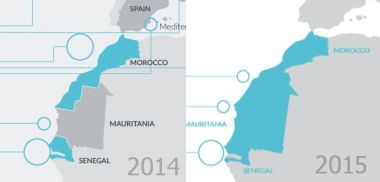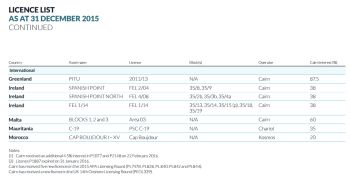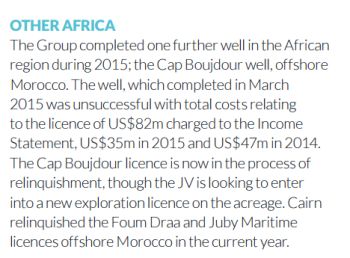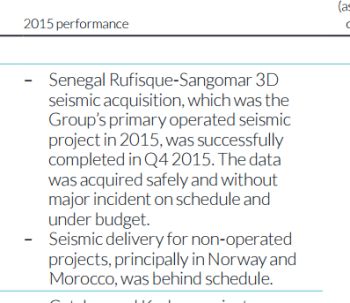
Scotland's Cairn Energy states that its joint venture with American firm Kosmos Energy has dropped the oil exploration licence in occupied Western Sahara, but ... that it is now reapplying for part of the very same area.
Photo above; Saharawi refugees protesting against Cairn's involvement in their occupied homeland, around the time of Scotland's referendum on independence in September 2014
UPDATE, 19. April 08:20. Kosmos Energy stated to Upstream Online on 15 April that “We are far beyond applying for a new licence. We’re actually deep in negotiations for a new agreement called Boujdour Maritime that covers nearly the same area (as Cap Boujdour).”
In its Annual Report for 2015, Scottish oil company Cairn Energy stated that "the Cap Boujdour licence is in the process of relinquishment, though the joint-venture is looking to enter into a new exploration licence on the acreage". (p. 33)
That joint-venture ties Cairn to Kosmos Energy, a Texas based oil company. Together, Cairn and Kosmos have undertaken the first ever offshore well-drilling in occupied Western Sahara in March 2015. A highly controversial operation, as the joint-venture had obtained its licence to the Boujdour block from the Moroccan government, which has no mandate to administer Western Sahara. In spite thereof, Morocco continues to occupy a large part of what is often referred to as Africa's last colony, and proceeds to sell of its resources for its own benefit.
However, the result of that first exploratory drilling operation wasn't all too promising. "The CB-1 well drilled in Cap Boujdour, encountered hydrocarbons but the discovery was non-commercial and the well was plugged and abandoned in Q1 2015", Cairn's annual report reads on page 31. "The well, which completed in March 2015 was unsuccessful with total costs relating to the licence of US$82m charged to the Income Statement, US$35m in 2015 and US$47m in 2014", the report continues (p.33).

Nevertheless, Cairn and Kosmos are reapplying for a next exploration licence on the very same acreage. "Discussions are ongoing with Office National des Hydrocarbures et des Mines (ONHYM) for a new Boujdour Maritime contract area offshore Western Sahara (Kosmos Operator 55% WI, ONHYM 25% WI, Cairn 20% WI)", it says on p. 31 of Cairn's annual report.
Just as in the annual report of the year before, Cairn again totally fails to understand the basic principles of the conflict of Western Sahara. Throughout its annual report, Cairn refers to the block as lying within "Morocco", which is not the case. Cairn has adapted all maps from last year's report, by removing all international borders between Western Sahara and the neighbouring countries. The border to Morocco was removed last year. The company keeps refering to "Morocco" to describe the location of their block.
"We are calling on shareholders to engage with Cairn and Kosmos and urge the companies not to obtain a new licence", stated Joanna Allan, chair of Western Sahara Resource Watch.
"The approach of Cairn and Kosmos is grotesquely unethical. We urge all investors to look at the UN document that Kosmos and Cairn are using to try to legitimize their actions. The two companies are manifestly misrepresenting what the UN has concluded on the matter", stated Allan.
Cairn also states that the licences it held for oil blocks offshore Morocco proper, the so-called Foum Draa and Juby Maritime licences, were relinquished during the third and fourth quarter of 2015. So today, the only business interest Cairn has with the Moroccan government, relates to a territory that is not in Morocco.
The CEO of the company claims that Cairn "will continue to uphold and support the ten principles of the United Nations Global Compact".
WSRW sent a letter to Cairn on 19 February 2014 and on 13 April 2016. The company has not yet responded.
Cairn's 2015 annual report can also be downloaded here.
Failing in geography
Several years after Cairn entered into the block in Western Sahara, the company still cannot place their exploratory well in the right country. Their well was not drilled in Morocco. In fact, Morocco has not even laid a maritime claim over the area where the well is located. Cairn also claims to be following the UN on the topic, by misrepresenting the conclusion of a UN legal opinion on the matter.
The below segments are all from Cairn's recently published annual report for 2015.



Morocco allocates land in occupied Western Sahara to green hydrogen investors
Morocco’s ambitions to become a global green hydrogen powerhouse are accelerating. Yet, Rabat is allocating land in a territory it does not legally own.
US eyes minerals in occupied Western Sahara
Seeking to position itself as a key supplier of strategic minerals for Western powers, Morocco has signed a new agreement with the United States that covers Western Sahara’s waters and the critical minerals harboured there.
TAQA-Moeve obtains land in occupied Western Sahara
Morocco’s push for green hydrogen has taken a decisive step forward - on territory it does not legally own.
EU-Morocco Statement: autonomy without self-determination, law without lawfulness
A joint statement that came out of last week’s EU-Morocco Association Council asks readers to believe in a fiction: that an undefined autonomy plan imposed by an occupying power can satisfy the right to self-determination, and that respect for international law can coexist with the systematic ignoring of the EU’s own highest court.



